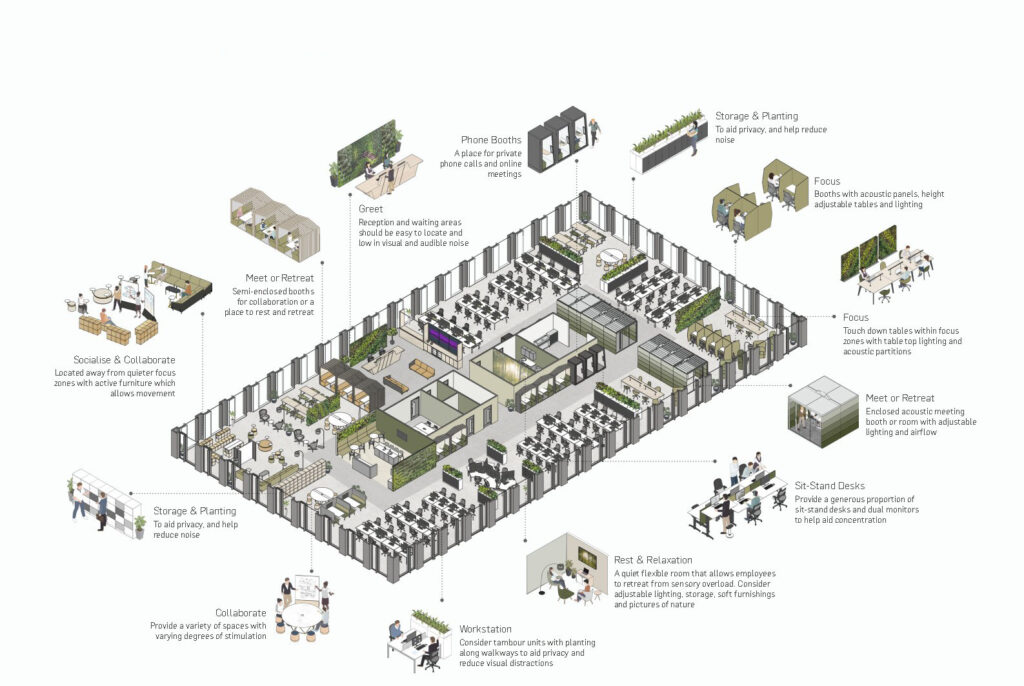Ian Chapman is AtkinsRéalis’ practice director for the Rail Systems & Infrastructure Practice. He has three sons, all of whom are neurodivergent in different ways, and is passionate about changing the industry to make it more inclusive for those who have neurodivergent characteristics and remove barriers to allow people to perform to their best potential.
Our workplaces are designed completely for the neurotypical, yet one in seven people are likely to be neurodivergent in some way, meaning workplaces may be missing out on further tapping into this talent.
Research commissioned by the charity Neurodiversity in Business (NiB) and undertaken by Birkbeck University of London this year found 65% of neurodivergent employees face fear of discrimination. But it doesn’t take much to improve the working environment to help make our colleagues more comfortable.
Start at the beginning
There are many barriers people with neurodivergent conditions may face when it comes to work, and these can start right at the beginning of the recruitment process. Many employers continue to unintentionally exclude or discard great talent. This is likely due to a general lack of awareness and understanding of neurodiversity, having inflexible hiring processes, and workplaces being designed only with neurotypicals in mind.

To raise awareness and drive change forwards, in 2019 AtkinsRéalis launched the Neurodiversity employee network. This is a safe space to learn about neurodiversity, share stories, and talk openly about experiences, and has over 900 active members. The network has since developed collateral and case studies to educate colleagues and clients; created training courses for employees, managers, recruiters, and HR; and launched a survey to understand the breadth of neurodiversity we have within our organisation.
Recognising that some neurodivergent colleagues could be excluded from the recruitment process at early stages, members of the network were consulted to improve our recruitment and HR policies. As a result, we developed some initial guidance on how to make our interviews more inclusive and have subsequently launched a training course, freely available to all employees who are actively involved in recruiting new team members. Plus, in 2022 we introduced a new policy for reasonable adjustments to ensure that disability, mental health, neurodiversity, and changes in life circumstances maintain a level playing field for all our employees so that no one encounters any additional challenge or difficulty.
59% of common adjustment types cost nothing to the employer but can make a real difference to our people. As no two people with neurodivergent characteristics experience their challenges in the same way, and every day is different, adjustments can be tailored on an individual basis – providing peace of mind and flexibility.
The inclusive office
One of our biggest learnings is that people with neurodivergent characteristics may experience spaces differently or to a more amplified extent than other members of the population. They may experience some form of sensory sensitivity which can make the individual prone to feeling overwhelmed and anxious in certain environments. These sensitivities can include sound, excessive or insufficient lighting, excessive movement, patterning, smells, and temperature.
Taking a step back, we realised that offices are generally designed for a one-fits-all approach. Rows of desks, bright lights, the chatter of people in meetings, being too hot or too cold – it’s understandable why offices can be uncomfortable for some people.
Our office in Birmingham is a great example of where we have made significant improvements to help make our offices more inclusive. It offers a variety of spaces to work and converse, with flexible environment options such as adjustable lighting and airflow, and acoustic partitioning. There are spaces to concentrate, collaborate, and even rest in our welfare rooms. Our wayfinding signage was reviewed and improved along with a reduced level of visual noise in our offices (such as patterns and colour of flooring, ceilings, and walls), and we have introduced more natural materials, plants, and views of outside spaces to provide a more calming and biophilic environment.
We’ve also deployed software tools to improve accessibility when working on a computer, and our Creative Design team has undergone training to make our digital and printed collateral more accessible. The AtkinsRéalis website is Web Content Accessibility Guidelines (WCAG) Level AA certified.

A recent innovation from the network is the introduction of ‘focus coasters’ to indicate whether a person is free to chat or does not want to be disturbed. These can help alleviate worries around not being able to concentrate in the office, or that awkward moment when you need to tell someone you “can’t talk right now”, and they have been embraced by many employees across our offices.
On top of that, the Neurodiversity network has been integral to changing our social and cultural practices. We understand that not everyone is comfortable with work social engagements, so we respect our employees’ choice to take part. Our people also have flexibility regarding clothing choice (where possible) and flexible work hours.
We still have a way to go, and we plan to use the Birmingham office as a blueprint for improving our other offices. In the post-COVID flexible working world, it’s one of our most well-attended workspaces.
The future is bright
Nurturing neurodiversity will truly make organisations better places to work. If we want to create the innovative solutions of tomorrow, we need to remove barriers every step of the way to open up a more diverse talent pool. We need to give our people the space to be themselves, be creative, and thrive. And thriving employees means a thriving business.
Neurodiversity refers to the infinite range of differences in individual human brain function and behavioural traits. This can include autism, dyslexia, dyspraxia, and Attention Deficit Hyperactivity Disorder (ADHD), among others, but also refers to the countless variations in the way people think, act and communicate. For people outside the ‘neurotypical’ range, trying to function in a world structured for neurotypicals can lead to low self-esteem and make mental health issues, such as depression and anxiety, more common.

